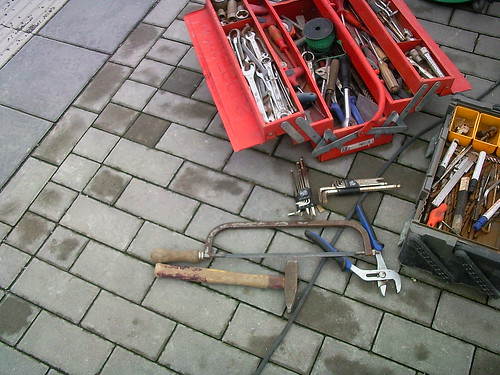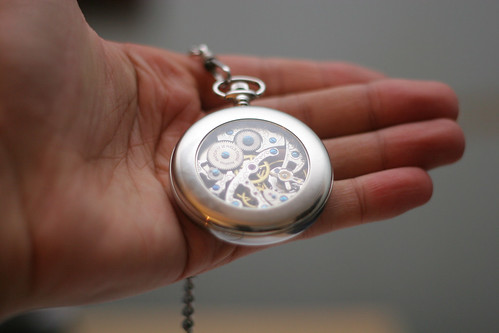 Today was a beautiful, sunny March 10th in Austin. Spring is in the air. There is nothing like going out for a run on a day like today.
Today was a beautiful, sunny March 10th in Austin. Spring is in the air. There is nothing like going out for a run on a day like today.
I rarely (if ever) run with an mp3 player as I like having the time to be able to disconnect from the noise of my daily world. It is a time to be at one with the sounds of my breathing, the pitter patter of my foot strikes, and the absolute pleasure of being alive. Thoughts come and go and my mind wanders freely. Reflection. Being. Present.
Then, in the purity of the moment, the thought crossed my mind: am I living the vivid existence that is worthy of time and life on planet earth? And, with all due respect to the Tragically Hip - am I living fully, completely?
 It is a common phrase in the world of physical therapy education: you need to have more tools in your toolbox. Frankly, the phrase drives me crazy.
It is a common phrase in the world of physical therapy education: you need to have more tools in your toolbox. Frankly, the phrase drives me crazy.
Clinicians learn to use a lot of tools. This isn't exclusive to physical therapy - far from it. Chiropractors, physicians, physical therapists - regardless of clinician, they all learn to utilize a broad range of tools in the care of various clinical conditions.
But what gets lost in the mix is the toolbox - the place you store all your tools and the process of reasoning used to select the correct tool. This becomes all the more readily apparent when discussing MDT (Mechanical Diagnosis And Therapy) with clinicians and students alike.
MDT is the toolbox - not the tools.
 The Information Age is now officially a part of the health care conversation. Or vice versa.
The Information Age is now officially a part of the health care conversation. Or vice versa.
In a 2012 national survey by the Pew Research Centerís Internet & American Life Project, it was found that 81% of U.S. adults use the Internet - with 59% seeking out health information online in the past year. Perhaps more importantly, 35% of U.S. adults say they have gone online specifically to try to "figure out what medical condition they or someone else might have". In other words, 35% of U.S. adults are considered "online diagnosers".
Meanwhile, in the year 2013, consumers continue to be faced with issues of access to care. The gatekeeper model continues to regulate a patient's access to care from many health care professionals in many states, including Texas and California.
Toto, we're not in Kansas anymore, and it is definitely not 1950. Now that we are in the Information Age, the model will need to change - and here's why.
 It would appear at times that the human condition thrives on complexity. Humans just love to make situations more complex. And when they do, it usually gets them in trouble.
It would appear at times that the human condition thrives on complexity. Humans just love to make situations more complex. And when they do, it usually gets them in trouble.
We see it in sport. At times you would think that it requires some modern day rocket scientist to coach a pro football team. At least that's what the pundits would have you believe. We do it in our own daily lives. We somehow find ways to make our days far more complex than they need be. Perhaps a more complex set of problems validates our challenging existence for the benefit of empathy and perhaps even rationalization of our behaviors.
We also do it in health care. Yes, the human body is based on a complex interaction of systems. But it is also operates on some very straightforward principles such as stimulus-response and homeostasis.
Rarely is the best solution the more complex option. Simplicity unto itself could be a prime health care solution. Just ask Albert Einstein.
 The best month of the year will be upon us tomorrow. No, it's not the month of my birthday. No, it's not the holiday season. No, it's not even the start of college football season - and that's a darn good month.
The best month of the year will be upon us tomorrow. No, it's not the month of my birthday. No, it's not the holiday season. No, it's not even the start of college football season - and that's a darn good month.
March is upon us. The days are getting longer. Daylight savings time begins this month. SXSW is a March phenomenon in Austin. But wait - there's more. How about March Madness? Add in the start of the F1 season, and you have a lot of reasons to celebrate - or, at least I do.
In the meantime, we have rhubarb to discuss. With no further adieu, here is Episode 061.
 It is a phrase that has always evoked a raised eyebrow or two. "Fear of success". It is easy to imagine someone having a fear of failure, but success? Really?
It is a phrase that has always evoked a raised eyebrow or two. "Fear of success". It is easy to imagine someone having a fear of failure, but success? Really?
Absolutely. It is far more common than we might imagine.
Don't we all want to be successful? Why would anyone have a fear of success?
Your comfort zone has to allow you to embrace it. Fear of success has a best friend: self sabotage. The two co-exist quite nicely.
So how does an athlete, a patient, or a friend have a fear of success? A few examples are in order.
 Hype. Pageantry. Red carpet. Lame jokes. Lousy masters of ceremony. Paparazzi. Outfits that only People Magazine could appreciate. Wardrobe malfunctions. And all points in between.
Hype. Pageantry. Red carpet. Lame jokes. Lousy masters of ceremony. Paparazzi. Outfits that only People Magazine could appreciate. Wardrobe malfunctions. And all points in between.
You've seen it on TV many times before: the Academy Awards. But for that matter, it could be the Grammy Awards or the Golden Globes or any one of countless awards ceremonies. Frankly, the statuette doesn't matter. Nor does the genre. And you certainly don't have to be a fan of awards shows on TV.
What is most important is the passion underlying these celebrations of creativity. It is the beauty of an artist, diving deep within, to find something bigger than themselves - and then to share it with the world.
 "Running Injuries: Etiology And Recovery- Based Treatment" (co-author Bridget Clark, PT) appears in the third edition and fourth editions of "Clinical Orthopaedic Rehabilitation: A Team Approach" by Charles Giangarra, MD and Robert C. Manske, PT.
"Running Injuries: Etiology And Recovery- Based Treatment" (co-author Bridget Clark, PT) appears in the third edition and fourth editions of "Clinical Orthopaedic Rehabilitation: A Team Approach" by Charles Giangarra, MD and Robert C. Manske, PT.
 Allan Besselink, PT, DPT, Ph.D., Dip.MDT has a unique voice in the world of sports, education, and health care. Read more about Allan here.
Allan Besselink, PT, DPT, Ph.D., Dip.MDT has a unique voice in the world of sports, education, and health care. Read more about Allan here.
 Top 5 finalist in three categories: "Best Overall Blog", "Best PT Blog" and "Best Advocacy Blog".
Top 5 finalist in three categories: "Best Overall Blog", "Best PT Blog" and "Best Advocacy Blog".